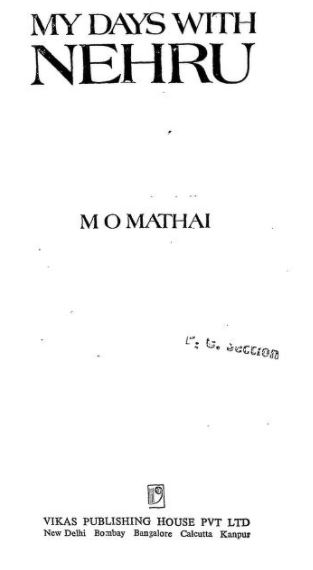‘M O Mathai On Nehru ‘ PDF Quick download link is given at the bottom of this article. You can see the PDF demo, size of the PDF, page numbers, and direct download Free PDF of ‘M.O. Mathai’ using the download button.
My Days With Nehru PDF Free Download

My Days With Nehru
Apart from his attraction for mountains, his love of animals and children, as well as flowers, plants, and trees, was one of Nehru’s pronounced qualities.
His love of children was totally different from that of professional politicians of the West for whom patting and kissing children in public is a vote-catching gimmick.
To all normal people, children are a joy to watch and to play with. Nehru saw in their innocent faces and sparkling eyes the future of India.
He was convinced that no amount of money spent on children and their mothers was too much and that it was a sound investment for the future.
He was deeply interested in any scheme designed to benefit children and women, more especially the provision of mid-day meals for the privileged school children.
Nehru was responsible for Indian schools introducing knapsacks that would hang on the backs of children instead of the front or the sides.
He wanted children not to be stooping but to be erect while walking with a loud of books on their backs. Nehru was interested in almost everything.
He retained the curiosity of a child throughout his life. When he heard that the extraordinarily good and motherly American woman.
Who was the wife of the American Ambassador Ellsworth Bunker, had devised some simple contraption.
Which would be of help to sweepers, he promptly invited her to tea on a Sunday afternoon at the Prime Minister’s House.
The elderly woman came in style in a huge Cadillac with a long-handled broom.
She held the theory that the backs of sweepers in Delhi, particularly women, were bent because they had been using short brooms all their lives.
Nehru tried the broom outside the Prime Minister’s House. He later asked the Delhi Municipal Corporation and the New Delhi Municipal Committee to introduce the long-handled broom and supply them to all the sweepers.
The Ambassador’s wife said she felt amply rewarded and made the comment “nothing moves in Delhi unless the Prime Minister takes an interest.”
The acceptance of my resignation was announced in the morning papers of 19 January 1959.
The lawyer-journalist reviewer has classified me as anti-Russian and pro-lsraeli.
Obviously the man has bats in his belfry^ just as Aruna Asaf AH had in 1947 when she called Nehru the Kerensky of India and made the most profound prediction that he would not last long.
That was when the woman was having a brief honeymoon with the Communist Party of India.
The rulers of Russia under the Stalinist regime also had bats in their belfry when they called Nehru the running dog of imperialism.
John Foster Dulles suffered from the same malady when he violently criticized Nehru and described non-alignment as immoral.
Bhupesh Gupta suffers from the same disease when he calls everyone except himself a foreign agent.
Recently I met a prominent member of the Communist Party of India (Marxist) who also had nothing but bats in his belfry.
He went into a vituperative harangue against Nikita Khrushchev, for whom I always had a soft corner.
He blurted out all the abusive epithets in the CPM jargon.
When he had let off enough steam, I asked him to cool down and tell me in one brief sentence why he hated Khrushchev so much. He replied “Khrushchev was pro-Russian.”
The meeting of the four took place in Malcolm Macdonald’s house. Detailed maps of India and Pakistan showing the State of Jammu and Kashmir were at hand.
The two diplomats had several talks earlier on the subject. At the outset N.R. Pillai told them that he was not representing the government and that he would only be a silent observer.
1 said “you all know that I represent nothing and nobody and so I shall speak without inhibition.”
The diplomats said that the Kashmir question was a difficult one made more difficult by the cold war atmosphere at the UN.
They were of the view that the UN would never be able to solve the Kashmir problem.
They said that insofar as India was concerned, wisdom lay in forgetting, for the present, the political aspect of the Kashmir question by concentrating on removing from the minds of the Pakistanis their apprehensions about uninterrupted supply of water from the rivers flowing from Jammu and Kashmir.
They advocated an agreement on this and registering it with the UN. I said that the most appropriate thing would be to take up all the rivers of the “Land of the Five Rivers” and hammer out a comprehensive treaty under international auspices; and added that the prospe^ of achieving this would be brighter in Nehru’s life-time.
Both the diplomats welcomed the idea; and Ellsworth Bunker said that it was possible to bring the World Bank into the picture.
This was the beginning of the Indus Water Treaty. Both the diplomats worked hard on their governments like a pair of beavers until the project took shape.
The two diplomats made a prediction: “If you are patient and leave the Kashmir question alone, within 50 years the atmosphere in India and Pakistan will change and both countries will reconcile themselves to drawing up a permanent international boundary along the line of actual control with adjustments dictated by facts of geography.” ]
I said “I doubt if India will agree to give up the sparsely populated Gilgit’area which is of strategic importance to a large country.”
| Author | M O Mathai |
| Language | English |
| Pages | 288 |
| PDF Size | 14.0 MB |
| Category | Biography |
My Days With Nehru Book PDF Free Download
